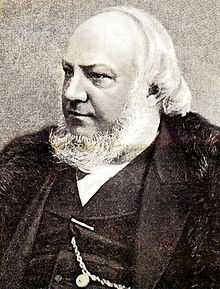Jacob Moleschott | |
|---|---|
 Moleschott in 1892 | |
| Born | Jacobus Albertus Willebrordus Moleschott 9 August 1822 |
| Died | 20 May 1893 (aged 70) |
| Nationality | Dutch |
| Education | Heidelberg University |
| Era | 19th-century philosophy |
| Region | Western philosophy |
| School | German materialism[1] |
| Institutions | Heidelberg University University of Zürich University of Turin University of Rome |
Main interests | Philosophy of science |
Jacob Moleschott (9 August 1822 – 20 May 1893) was a Dutch physiologist and writer on dietetics. He is known for his philosophical views in regard to scientific materialism. He was a member of German Academy of Sciences Leopoldina (since 1884).
Born in 's-Hertogenbosch, Netherlands, Moleschott studied at Heidelberg University, where he obtained his PhD in 1845, and began the practice of medicine in Utrecht in 1845, but soon moved back to Heidelberg University, where he lectured on physiology starting in 1847. The university reprimanded Moleschott for various controversial statements made in his lectures, leading to his resignation in 1854. Next to Carl Vogt and Ludwig Büchner, Moleschott stood in the center of the public debates about materialism in Germany in the 1850s.[4]
He taught as a professor of physiology at Zürich (1856), at Turin (1861), and at Rome (1879), where he died.
Moleschott explained the origin and condition of animals by the working of physical causes. He was an atheist which led to his removal from teaching at the Heidelberg University.[5] His characteristic formulae were "no thought without phosphorus" and "the brain secretes thought as the liver secretes bile." His major works are:
The Jacob Moleschoot fund is kept in the Archiginnasio of Bologna's public library.[6][7][8]